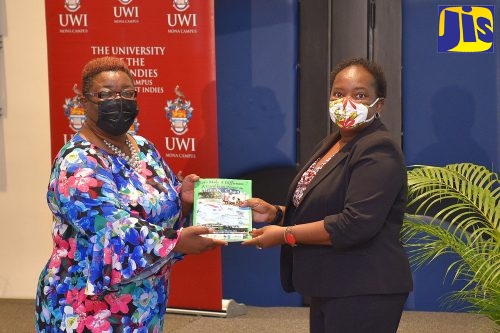Primary Schools Get Climate Change Educational Products
By: , March 1, 2022The Full Story
Students from seven primary schools across the Corporate Area and Clarendon, including children with disabilities, will benefit from a suite of educational products focused on climate change.
The products are being provided under a pilot project being undertaken by the Climate Studies Group at the University of the West Indies (UWI), Mona, aimed at strengthening the country’s resilience to climate change.
Included is a textbook entitled, ‘Let’s Make a Difference…A Caribbean Primer on Climate Change’ and an animation series based on the text.
The suite of products, which were launched recently at The Jamaica Pegasus hotel in New Kingston, also entail two key climate studies documents, including an executive summary on the State of the Caribbean Climate report and a YouTube channel on the report, which is formatted with audiovisual content for the disabled community.
There is also a Caribbean science volume prepared by UWI, and formatted in braille, which provides major updates on climate change.
The seven schools that form the pilot for the project have received reading gardens.
They are Randolph Lopez School of Hope, Constant Spring Primary and Junior High, Franklin Town Primary, St. Peter Claver Primary, and Harbour View Primary in Kingston and St. Andrew, and Mount Airy Primary and Infant, and Richmond Park Primary in Clarendon.
Dean of the Faculty of Science and Technology at UWI, Mona, Professor Michael Taylor, informed that under the project, the schools were provided with an eco-friendly gazebo and or portable tent with outdoor seating, powered by a fixed or portable solar energy-based solution.
He said they also received gardens with endemic plants and trees, to encourage the students to care for and study their growth and developed a culture of protecting the environment.
“Two of the schools have also received automatic weather stations [through the Meteorological Service of Jamaica]. They, therefore, join Jamaica in its quest to develop resilience through capturing information,” he noted, adding that an app will also be developed as part of the immersive learning experience.

Minister of Education and Youth, Hon. Fayval Williams, welcomed the initiative, noting that “it is only through education that we can understand climate change, in-depth, and begin to act in a way that has positive changes on our environment”.
She also highlighted the importance of the reading garden in helping the students gain practical knowledge about the importance of the plants and caring for the environment.
“While there is more familiarity with and use of the vocabulary about global warming, greenhouse gases, renewable energy, carbon footprint, etc., policymakers and educators are increasingly stressing the importance of educating children on environmental matters and developing a culture of caring for the climate,” she said.
Director General of the Planning Institute of Jamaica (PIOJ), Dr. Wayne Henry, in endorsing the undertaking, said that the results of the Improving Climate Data and Information Management Project (ICDIMP), under the pilot programme for climate resilience, helped to guide the formulation of the textbook, which is part of the suite of educational products.
“Conducted last year… the results [of the ICDIMP] indicate that 91.6 per cent of respondents are knowledgeable of the term climate change,” he said, adding that the findings “highlight the need for a deeper understanding about the concept in relation to its causes and impacts.”
“The results also point to inadequate knowledge of adaptation and mitigation measures that can and must be employed to transform Jamaica to that climate-resilient economy envisioned by 2030 Jamaica,” Dr. Henry said.
He said that the textbook is, therefore, in response to “a major gap identified and will, we expect, complement and amplify the impact of some earlier work by the Climate Studies Group Mona, which the PIOJ sponsored, and involved developing teaching and learning resource material for the primary level”.
For his part, Principal of UWI, Mona, Professor Dale Webber, in highlighting the importance of the project, said that young persons are more likely to “live with the long-term effects of a changing world, and the products provided will equip them and [inform] decision-making, with future impact in mind”.
“With present actions, we need to make changes, or we need to educate those who are going to make the changes,” he pointed out.
The Let’s Make a Difference…A Caribbean Primer on Climate Change textbook is available in soft and hard copies, which will also be used to train teachers for each of the schools specified.
Training videos will also be filmed and distributed to other schools.



